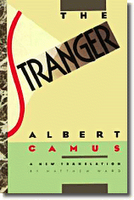 "With people evaluating your intelligence, background, politics and even how likeable you are by your selected reading, choosing the right book could be the key to projecting aspects of your personality," according to the spokesperson for Borders bookstore who spoke to the Guardian about a survey the book merchants conducted.
"With people evaluating your intelligence, background, politics and even how likeable you are by your selected reading, choosing the right book could be the key to projecting aspects of your personality," according to the spokesperson for Borders bookstore who spoke to the Guardian about a survey the book merchants conducted.The survey revealed that the "majority of the British public--57%--believe they can determine someone's personality by their choice of reading matter, while 42% think that a person's intelligence can be gauged in the same way."
But interpreting the data can be tricky:
Borders' "rough guide", which summarises what characteristics can be gleaned from a person's choice of book, marks [George W.] Bush as a reader of "literary fiction" [because his staff recently let it be known that he had read Camus' The Stranger while on vacation]. This means he is likely to be "a well-educated person who reads The Independent or Guardian and tunes in to Channel 4 or BBC 2 to satisfy more leftfield interests".Make of that what you will.
Click here for the Guardian article.
The writer Nick Hornby argues you shouldn't infer anything in particular from what one reads and you shouldn't care what they infer about you from your reading choices.
--Marshal Zeringue[P]lease, please stop patronising those who are reading a book--The Da Vinci Code, maybe--because they are enjoying it.
For a start, none of us knows what kind of an effort this represents for the individual reader. It could be his or her first full-length adult novel; it might be the book that finally reveals the purpose and joy of reading to someone who has hitherto been mystified by the attraction that books exert on others. And anyway, reading for enjoyment is what we should all be doing.
I don't mean we should all be reading chick-lit or thrillers (although if that's what you want to read, it's fine by me, because here's something else no one will ever tell you: if you don't read the classics, or the novel that won this year's Booker Prize, then nothing bad will happen to you; more importantly, nothing good will happen to you if you do); I simply mean that turning pages should not be like walking through thick mud.
The whole purpose of books is that we read them, and if you find you can't, it might not be your inadequacy that's to blame. 'Good' books can be pretty awful sometimes.





